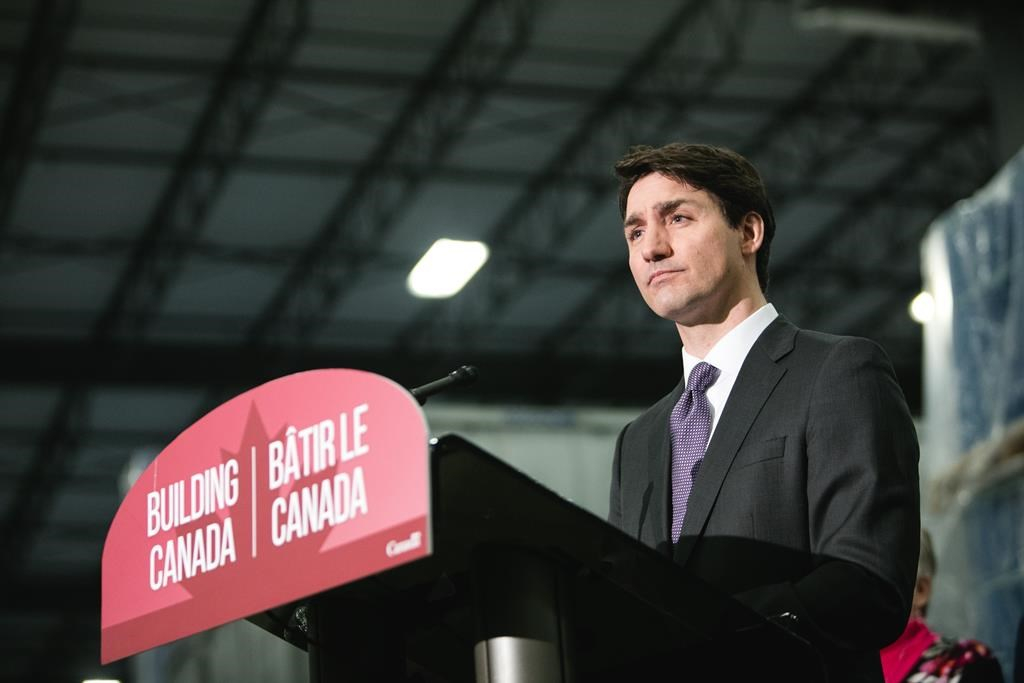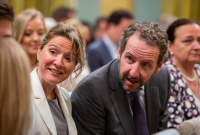Support strong Canadian climate journalism for 2025
Prime Minister Justin Trudeau will be pressured Monday to testify at a House of Commons committee looking into allegations the prime minister and his staff pressured former attorney general Jody Wilson-Raybould to stop a criminal prosecution of Montreal-based engineering giant SNC-Lavalin.
The Conservative party will introduce a motion arguing that since Trudeau keeps saying the Commons justice committee is well placed to investigate the allegations, he should have no problem showing up there himself to answer questions about his role in the matter.
The motion will ask all MPs to vote to call Trudeau before the committee for at least two hours, by March 15.
Motions in the House of Commons are not binding and regardless of the outcome, the committee itself would still have to decide whether to invite Trudeau. Besides that, MPs, including the prime minister, cannot be forced to appear before committees.
Conservative leader Andrew Scheer said Friday the committee has already heard from the clerk of the Privy Council, Michael Wernick, that "Justin Trudeau had his fingerprints all over this."
Wernick told the committee Thursday that no improper pressure was applied to Wilson-Raybould, who quit the cabinet last week, and that Trudeau's staff have conducted themselves with "the highest standards of integrity."
He said that Trudeau was worried a prosecution might result in SNC-Lavalin's moving its operations overseas or closing up shop, hurting innocent employees, shareholders, pensioners, third-party suppliers and communities in which the company operates. Wernick said he told Wilson-Raybould about those concerns during a conversation in December but that his intention was to provide "context," not pressure.
He also said the prime minister assured Wilson-Raybould at every opportunity that a decision on whether to halt the prosecution was hers alone.
Trudeau said Wernick's words should carry weight with Canadians.
"The clerk of the privy council, Michael Wernick, is an extraordinary public servant who has served this country and continues to serve this country under governments of different political stripes, with integrity and brilliance," said Trudeau. "He is someone we need to heed very carefully when he chooses to express himself publicly and I'm sure everyone is taking a careful look at his words yesterday."
But Scheer said Wernick's testimony laid bare just how many times Trudeau, members of his political staff, and Wernick spoke to Wilson-Raybould in an attempt to change her mind and allow SNC-Lavalin to enter into a remediation agreement rather than go on trial for fraud and bribery related to the firm's work in Libya.
Scheer dismissed Wernick's assertion that those conversations were within bounds.
"It's all well and good for someone who is trying to defend his own actions and defend the actions of the government to come to that conclusion," said Scheer.
Some opposition MPs and pundits have suggested Wernick crossed into partisanship by defending the government. Scheer wouldn't go that far but he did seem surprised by what Wernick said.
"I had certainly not seen a performance like that in the past," said Scheer.
Trudeau's government has been rocked by the anonymous allegations that Wilson-Raybould was under pressure from the Prime Minister's Office to instruct the director of public prosecutions to negotiate a remediation agreement with SNC-Lavalin — a kind of plea bargain that would force the company to pay restitution but would spare it a criminal conviction that could cripple it by barring it from bidding on government contracts for up to 10 years.
Also on Friday, SNC-Lavalin chief executive Neil Bruce lashed out over the pummelling the company is taking from politicians.
"Frankly, we've had enough of all that, and we're just going to vigorously defend ourselves in court, and that's our strategy," he said.
Bruce said the Public Prosecution Service of Canada can still invite SNC-Lavalin to negotiate a remediation agreement and the company would be willing to do so.
"But frankly, it doesn't look like that today," he said.
Trudeau was not as eager to heed Wernick's opinion on solicitor-client privilege, the principle Wilson-Raybould has repeatedly cited to refuse comment on the allegations that she was improperly pressured. The clerk told the committee he doesn't think solicitor-client privilege applies in this instance and it's up to Wilson-Raybould to choose how much she wants to say on the matter when she appears before the committee next week.
Trudeau said he is still receiving advice on whether to waive the bond of secrecy between lawyer and client because there are potential consequences for two ongoing court cases against the company.
Scheer accused Trudeau of "cherry picking" which parts of Wernick's testimony he wants to listen to.
Trudeau is seeking advice on the privilege matter from David Lametti, whom he appointed justice minister and attorney general in an early January cabinet shuffle in which he moved Wilson-Raybould to the veterans-affairs post.
Under opposition demands Friday to explain why solicitor-client privilege has not been waived, Lametti told the Commons it's an exceptionally complex issue but he's doing his "level best" to find a way "such that the former attorney general can, in fact, speak."
— with files from Christopher Reynolds in Montreal.





Comments